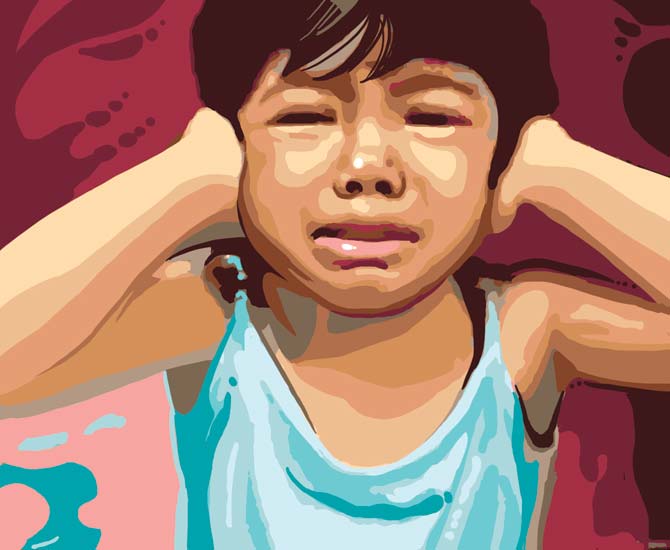A three-year-old shouldn't be taught numbers or writing. But, it's another trap of the education system where no one knows what's going on

 A video of three-year-old Haya weeping and begging her mother to back off while teaching her math went viral last month after Virat Kohli shared it, expressing his disapproval. Illustration/ RaviÂÂu00c2u0088Jadhav
A video of three-year-old Haya weeping and begging her mother to back off while teaching her math went viral last month after Virat Kohli shared it, expressing his disapproval. Illustration/ RaviÂÂu00c2u0088Jadhav
ADVERTISEMENT
"What is your name?" asks a teacher (one assumes) in an animation video available on YouTube. The child sitting across the table says, "My name is Ravi."
"What is your father's name?"
"My father's name is Ranjan."
"What is your mother's name?"
"My mother's name is Mala."
Further questions follow: favourite fruit, favourite vegetable, etc. And the child has answers to them all, with enunciation that would put most adults to shame.
But, here's the thing. The child is three years old. And, this is not a classroom conversation. It's a video for a mock interview purportedly to help parents prep their tots for when they face examiners for admission to pre-school, i.e. playschool to senior KG.
Last month, the whole country expressed horror at the video of a three-year-old (identified later as singer-composer duo Toshi and Sharib Sabri's niece Haya) being yelled at by her mother who was making her learn numbers, saying that unless they push the child, she doesn't sit to study. And, that her teacher too had raised this issue.
Traps of education
The parent of a 15-year-old studying at a Mumbai school, says it's a problem of too much pressure too soon. And, because the pressure is on the kids to learn a lot, it translates into pressure on parents.
"By end of Junior KG, my son, who was four years old, had been taught how to write in capital letters. Then, the teachers went straight to cursive writing. And, this wasn't done in a play format. My son didn't know how to read, but could write in cursive and so, did it mechanically.
One day he made a small "u" and it looked like an "m", but he didn't know the difference."
Another parent, Nasrin Modak-Siddiqi, recalls that her son Ashaz, who is now four, returned home almost every day with homework to fill up from the Kurla West pre-school he attended until recently. "This meant that I would have to sit and write with him, holding his hand. He didn't want to study at all. Now [that he has shifted to another school], he doesn't want to do homework, because his idea was that when there's homework, 'Mama needs to sit with me and shout at me'," she adds.
No consensus on curriculum
Swati Popat, the president of the Early Childhood Association (ECA), a not-for-profit organisation that is an advocacy for "stress free childhood years" and has 5,000 pre-school members, says India's policy as defined by the Centre delineates what should be taught to pre-schoolers at various ages. However, this is a concurrent subject which means that the state decides what curriculum to follow.
"In addition, Sarvashiksha Abhiyan -- which creates a common education policy -- starts at the age of six. Pre-primary doesn't come under the Education Department of most states. So, it's not governed. This means that pre-primary in all states is a trickle down effect of guidelines of Std 1 curriculum. So, if Std 1 defines that the child should know addition before admission, senior KG will have to do numbers and counting."
She takes the example of CISA, a global method of assessing students scores, and says that Finland, which doesn't test its kids till the age of 15/16, has been consistently scoring high. In fact, Finland's education system is considered one of the best globally. "Their pre-school doesn't have writing, only play-based activity."
On the viral video, she says, parents and teachers get caught in a blame game. The former said there's too much pressure and the latter claimed that parents were keen that their kids learn more and fast. "But, this is not what a three- year-old should be exposed to. Play way, a method which concentrates on a child's readiness to learn through stories, rhymes and games," is what is recommended.
Kishore, Principal, VIBGYOR High-Airoli, agrees. He says that the effort is always to make learning fun. "In playgroup, we impart lessons that increase social adaptability and hone cognitive skills."
Popat says ECA has written to the HRD ministry as well as the Women and Child Development Ministry to define a curriculum for preschool in sync with the Central policy. But, there has been no response.
As far as the question of interviews go, Popat says that as per as RTE rules, interviews for school admission have been banned.
Education for brain development
Shamim Mehrotra, director for outreach services and senior counselor at Ummeed Child Development Centre, says research has shown that the brain develops rapidly in first five years. "So, if a child is not stimulated enough or exposed to words or language s/he can be at a little risk. But, that doesn't mean that rote learning is the method to follow. It will put the fear of learning in the child and the cost of that is quite significant," Merchant adds.
 Subscribe today by clicking the link and stay updated with the latest news!" Click here!
Subscribe today by clicking the link and stay updated with the latest news!" Click here!






